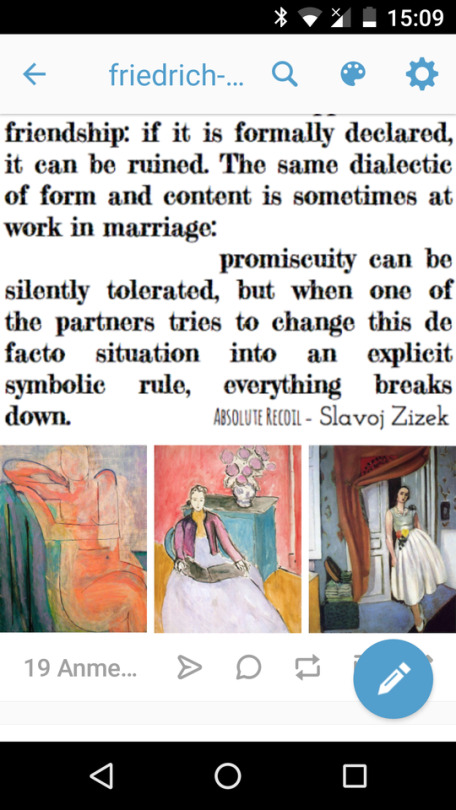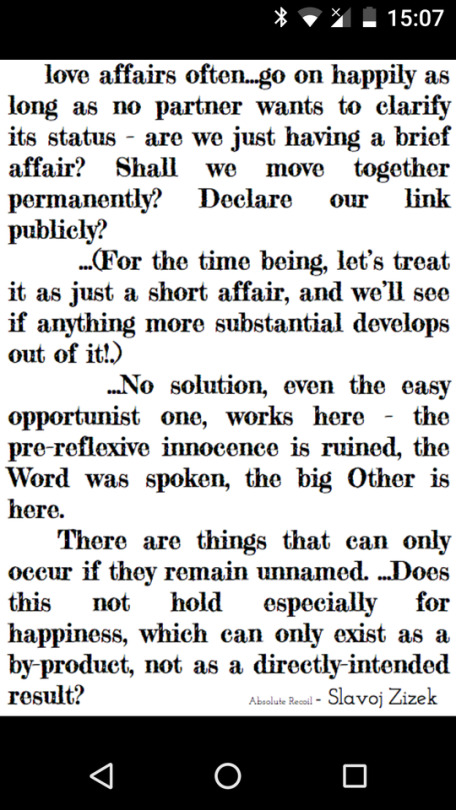

@mugasofer asked: I would be fascinated to hear you defend this claim.
***
It's just the Tree of Knowledge in the Garden of Eden. Or Zizek's favorite metaphor, Wile E. Coyote, which is the same thing.
***
(Okay, besides the last line about happiness, which is just a dumb platitude that attempts to mystify what makes people happy.)
What really works about Zizek's pop-philosophy writing style, is that he will give some very common everyday occurrence in normal life that is pretty weird when you think about it. Then he will give a psycho-economic explanation for it, based on Lacan or other critical theorists. This only works if you already empirically agree that his everyday example happens; it does not work for proving to you that such things do happen if that is not your experience.
In this case, he uses the example of "lovers who do not yet define their relationship." Are you flirting, are you dating, is this an affair yet, is this a relationship, all those ambiguous phases. Certainly in my experience this is a very common stage of most relationships. (For all the mockery the "Left Behind" novels get, they are an excellent depiction of the American Evangelical worldview, including the main character having just this sort of "undefined flirting" with the femme fatale.) Either you agree that exists as a phenomenon, or you don't. If you don't, I can't help you.
And the thing about these undefined lovers is that not only do they defy traditional answers to "what are you to each other," but they usually rely on not even asking the question. You can not even discuss "So, are we dating?" without it suddenly becoming awkward. See this parody from Reductress. The problem is not solely the labeling of the relationship, but even the consideration of what factors would determine the label. The magical moment of the new relationship relies on not questioning or even thinking about "what are you," but just going along with the ride.
This is the natural contradiction and mystification of ideology, where you can go along happily so long as you never ask the hard questions that challenge the ideology. We were just talking about progressive ideology's unwillingness to ask the question "which of our myriad causes is the most important?" or you can look at Republican ideology's inability to draw the line "how far would Trump have to go before you abandon him?"
This is our favorite coyote, who can run on air so long as he never notices. The minute he looks down, and becomes aware of his impossible state, is only then when he succumbs to gravity.
The concept of "innocence" is similarly highly ideological. Innocence is not just "the lack of doing evil" but lack of awareness of the possibly of doing evil. That is why a child who sees a brutal murder is "robbed of their innocence." Or if someone is offered sexual favors, there is no "innocent" answer to it - they must suddenly consider whether they want that or not, and in doing so they have considered sex, and have entered maturity. (Or as we know, the truly innocent answer is to be so naive you don't understand the offer, and continue on blithely.)
This is why the Fruit of Knowledge destroyed the Garden of Eden. Because once Adam and Eve then had the choice between Good and Evil, once they knew Evil was a possibility, then they could no longer exist in a state of innocence, even if they chose Good.
We can see this Garden of Eden at work in most lively communities. A community floats on the magic of never explicitly defining their rules and boundaries. They might have some very loose ideals, or even a few rules made by geeks who enjoy that sort of thing, but it's still usually an open question of enforcement, and a million possible edge cases that no one wants to deal with. For instance, the comments section of a popular blog: the blog might enjoy proclaiming "Free Speech" and so declare a principle of anything goes in the comments, yet any blog that has done that and gotten a following has found that there become a lot of things you want to censor after all (for instance: commenters who harass other commenters for expressing the wrong opinion.) The blog author might vaguely know it's a possibly problem, but they hope it doesn't come up and they avoid thinking about it, because that's not the spirit of a fun-easy going community.
Once the harassment, and spam, and the desire to minimize disproportionately represented viewpoints, actually happen, then the leader(s) of the community have some very awkward decisions to make. And while some answers are worse than others, it is the mere experience of having to debate those questions that destroy the group's innocence. Things are now less fun, and more stultifying, until you find another community. And that newer community rarely has "found an answer" to these awkward questions, so much as it is once again a place where you can pretend you don't need an answer to them because the problem hasn't and never will come up. Thus continues the cycle of TAZ.
We should of course reject this form of innocence, willful ignorance of possibilities, and the attempts to float past ideological contradiction.
No comments:
Post a Comment